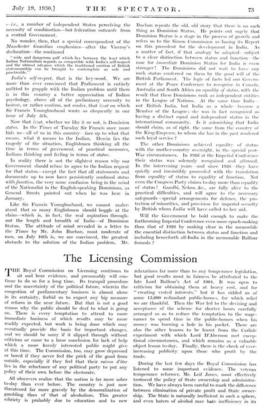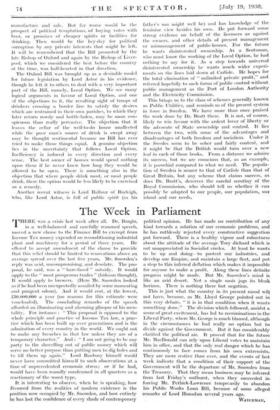The Licensing Commission
THE Royal Commission on Licensing continues to sit and hear evidence, and presumably will con- tinue to do so for a long time. Its tranquil procedure and the Uncertainty of the political future, wherein the congestion of parliamentary business is almost alone in its certainty, forbid us to expect any big measure of reform in the near future. But that is not a good reason why the public should be deaf to what is going on. There is every temptation to attend to more immediate business of which results may be more readily expected, but work is being done which may eventually provide the basis for important changes, and we should be sorry if it 'slipped through without criticism or 'came to a lame conclusion for lack of help which a more keenly interested public might give at this time: The Commission, too, may grow depressed or bored if they never feel the prick of the goad from outside, especially if they feel that their raison d'etre lies in the reluctance of any political party to put any policy of their own before the electorate.
All observers realize that the nation is far more sober to-day than ever before. The country is just now threatened far more gravely by the demoralization of gambling than of that of alcoholism. This greater sobriety is probably due to education and to new
relaxations far more than to any temperance legislation, but good results must in fairness be attributed to the late Lord Balfour's Act of 1904. It was open to criticism for obtaining then at heavy cost, and for " creating vested interests," but it has ridded us of some 15,000 redundant public-houses, for which relief we are thankful. Then the War led to the devising and acceptance of the scheme for shorter hours carefully arranged so as to reduce the temptation to the wage- 'earner to spend time in the public-houses when his money was burning -a hole in his pocket. There are also the other lessons to be learnt from the Carlisle experiment with which Lord D'Abernon met excep- tional circumstances, and which remains as a valuable object lesson to-day. Finally, there is the check of ever- increasing publicity upon those who profit by the trade.
During the last few days the Royal Commission has listened to some important evidence. The veteran temperance reformer, Mr. Leif Jones, most effectively troanced the policy of State ownership and administra- tion. We have always been careful to mark the difference between elimination of private profit and State owner- ship. The State is naturally inefficient in such a sphere, and even haters of alcohol may hate inefficiency in its manufacture and sale. But far worse would be the prospect of political temptations, of buying votes with beer, or promises of cheaper spirits or facilities for drinking. Then would be the hey-day for political corruption by any private interests that might be left. It will be remembered that the Bill promoted by the late Bishop of Oxford and again by the Bishop of Liver- pool, which we considered the best before the country at the time, was half-hearted in that direction..
The Oxford Bill was brought up as a desirable model for future legislation by Lord Astor in his evidence, though he left it to others to deal with a very important part of the Bill, namely, Local Option. We see many logical arguments in favour of Local Option, and one of the objections to it, the revolting sight of troops of drinkers crossing a border line to satisfy the desires which are restrained in their own parishes, to which they later return rowdy and bottle-laden, may be more con- spicuous than really pervasive. The objection that it leaves the cellar of the well-to-do house unaffected while the poor man's source of drink is swept away may he thought sentimental because no Bill has ever tried to make those things equal. A genuine objection lies in the uncertainty that follows Local Option. Inefficiency is induced in every direction and every sense. The best owner of houses would spend nothing upon them if he never knew how long they would be allowed to be open. There is something also in the objection that where people drink most, or most people drink, there the option would be less likely to be exercised
• as a remedy.
Another recent witness is Lord Balfour of Burleigh, who, like Lord Astor, is full of public spirit (as his
father's son might well be) and has knowledge of the feminine view besides his own. He put forward sonic strong evidence on behalf of the licensees as against the owners, and other details of present management or mismanagement of public-houses. For the future he wants disinterested ownership. As a Scotsman, who must know the working of the Local Option, he had nothing to say for it. As a step towards universal disinterested ownership lie wants much wider experi- ments on the lines laid down at Carlisle. He hopes for. the total elimination of "unlimited private profit," and referred hopefully to such forms of public control -without public management as the Port of London Authority and the Electricity Commission.
This brings us to the class of schemes generally known as Public Utilities, and reminds us of the present system in force in Sweden. We have more than once praised the work done by Dr. Bratt there. It is not, of course, likely to win favour with the ardent lover of liberty or the advocate of State ownership and control. It lies between the two, with some of the advantages and disadvantages of both freedom and socialism. Under it the Swedes seem to be sober and fairly content, and it might be that the British would turn over a new leaf in each of those books. From a distance we admire its success, but we arc conscious that, as an example, - it is parochial compared to what we need. The popula- tion of Sweden is nearer to that of Carlisle than that of Great Britain, but any scheme that claims success, as does Dr. Bratt's, deserves the careful scrutiny of the Royal Commission, who should tell us whether it can possibly be adapted to our people, our population, our island and our needs.

















































 Previous page
Previous page